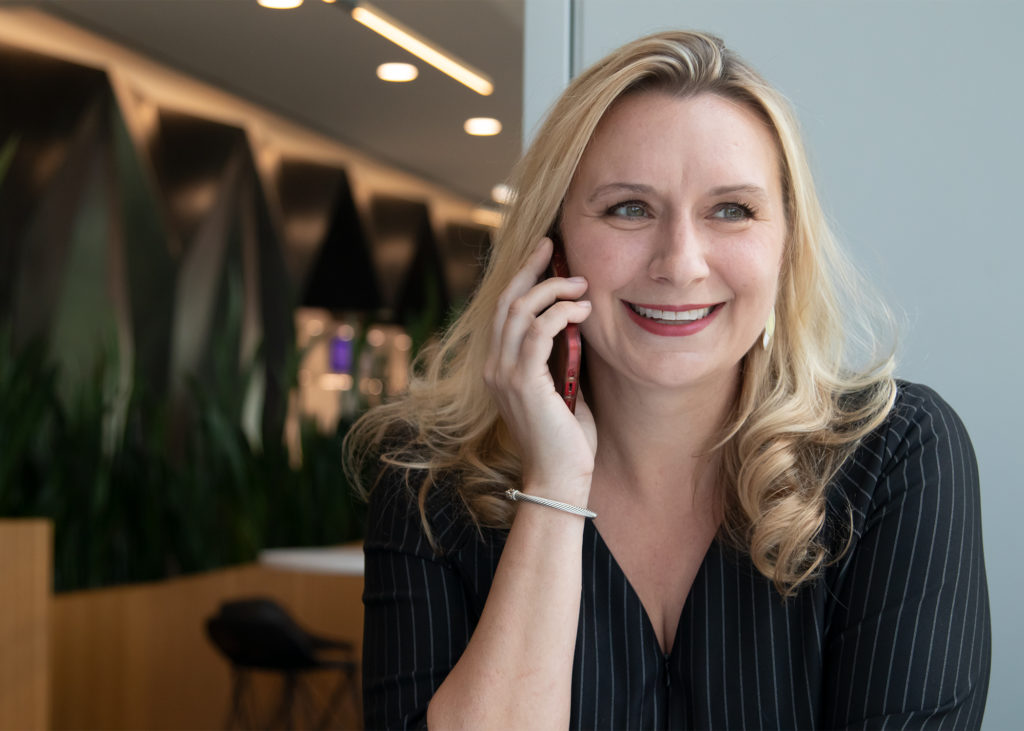
Ashley Frankson Hill was in the third grade when she marched into her parent’s living room and announced she was going to Princeton for college.
“No, you’re not,” they responded. “You’re going to Texas A&M.”
“Every single member of my family has gone to Texas A&M – my grandfather, my parents, my aunts and uncles, their spouses, my brother and all of my cousins,” she told The Texas Lawbook in an interview. “But I had heard that Princeton was a top college, and I decided it was my goal to attend, even when I did not even know where the college was located.”
Her father told her she would have to work extra hard and get good grades.
“From that moment on, I … foolishly told everyone in town for the next eight years that I would attend Princeton,” she said. “The more shocking surprise is that I was actually accepted to Princeton and graduated from there.”
Now married and a senior counsel at global energy giant BHP, Ashley Frankson Hill was the first person from her high school in Bay City, Texas, to attend Princeton and one of only three students in school‘s history to attend an Ivy League school. Princeton “turned out to be a perfect fit” for her for college.
But lawyers who know Hill say the Princeton story has a more important lesson: If Hill puts her mind to do something, it will happen.
The lead litigator and labor and employment lawyer for BHP’s North American operations, Hill is at the forefront of efforts to aggressively diversify the ranks at the global mining, minerals and petroleum giant, which has 80,000 employees and reported 2021 revenue of $60 billion.
Hill is one of five corporate leaders on BHP’s global legal inclusion council, which is charged with improving the diversity of its recruiting, hiring, compensation and retention practices. And she and BHP are witnessing significant successes.
So much so that the Association of Corporate Counsel’s Houston Chapter and The Texas Lawbook name Hill as one of two finalists for the 2022 Houston Corporate Counsel Award for Achievement in Diversity and Inclusion.
ACC Houston and The Lawbook are honoring the finalists and announcing the winners May 19 at the annual awards event at the Four Seasons Hotel in Houston.
Premium Subscribers: Click Here for a Q&A with Ashley Hill, where she reveals her pet peeves regrading outside counsel and makes a case for being hopeful about the future of diversity in the legal profession.
Hill said BHP wanted her to focus on a global gender diversity initiative that brought more female employees to two historically male-dominated industries – mining and oil and gas.
“In some regions of the world, BHP’s employees were only three percent female, so it was a lofty but important goal,” she said. “We wanted to increase our female employees, but we also wanted to make sure we did so equitably and without discriminating against males.
“Currently, we have an aspirational goal to increase our female representation globally in the company by three percent each year,” she said. “Of course, this aspirational goal will not be achieved by merely hiring more women. Retention and promotion are equally as important. We want to make sure our female employees know that they are valued for their contributions so that they choose BHP as their employer for the long term.”
Norton Rose Fulbright senior associate Jesika Silva Blanco, who nominated Hill for the award, said Hill played a key role “implementing initiatives and training across the globe for the legal group regarding racial biases, improving the company’s recruiting and hiring practices, and embedding inclusion and diversity goals with the company’s external law firms.”
“In the U.S., Ashley was instrumental in implementing a gender pay gap review, which resulted in an increase in female salaries globally of over $4 million dollars,” Blanco said. “Ashley then worked to further this review in late 2021 to include a pay gap review based on employees’ race and ethnicity to ensure that minority employees are paid similarly to White employees performing similar jobs and duties.”
BHP has twice recognized Hill internally for her D&I achievements. In 2021, the company’s employee resource group named Hill an Ally for Women of Color after she helped implement a corporatewide anti-racism campaign.
Blanco points out that Hill also fosters inclusion and diversity within the Houston legal community.
For example, she served as a trustee for three years on the nonprofit Association of Women Attorneys Foundation, which provides scholarships to women law students in Houston “to encourage women to enter the practice of law and advocate for underserved communities.” The foundation also provides fellowships allowing recent female law graduates to do public service work for pro bono operations like the Tahirih Justice Center and the Houston Volunteer Lawyers.
“Ashley’s commitment to DEI I think is very organic – she has never met a stranger,” said Shauna Clark, a partner at Norton Rose Fulbright and chair of the firm’s U.S. operations. “She treats everyone well. She doesn’t play favorites. Because she sees the best in everyone, it’s in her nature to treat everyone fairly and with respect. So, diversity, equity and inclusion come naturally to her.”
On top of her passion for diversity, Hill is an exceptional lawyer, according to lawyers who have practiced with her.
Beck Redden partner David Jones said Hill’s nearly six years with BHP has seen the corporation go “through a great deal of transition, but that has never hindered her ability to do her work effectively.” And she always has a positive attitude.
“When businesses change, there can be a desire to look forward and not back, and litigation from the past can be an annoyance,” Jones said. “However, Ashley has an incredible great ability to convey the importance of her work to her clients and to maintain focus on the best resolution. Regardless of any changes in personnel or business direction, Ashley is always able to find the right people and to get the right answers to manage her matters seamlessly.
“Litigation has its ups and downs, but I do not think I have ever seen her frown,” he said.
Hill credits her work ethic and moral compass to her parents, a summer during college that she spent working at an orphanage in Belarus and the tremendous lawyers who trained her over the years, especially those at Norton Rose Fulbright.

She was born and raised in Bay City, Texas, which is a small town of approximately 15,000 people about 90 minutes southwest of Houston. Her family roots in the community are deep. Both sets of her grandparents lived in Bay City and her parents were local high school sweethearts.
“Let’s put it this way – my maiden name is Frankson, and I grew up on Frankson Road,” she laughs.
Hill’s mother was a high school biology teacher, who retired after 43 years of teaching public school and received her master’s degree in entomology – the study of insects – and was an adjunct professor on the subject at a nearby junior college.
“She is quite the overachiever,” Hill said. “She wrote her own marine biology textbook when she felt the other textbooks did not cover the subjects appropriately. The walls of my childhood home, where my parents still live, were full of displays of beautiful butterflies, beetles and other insects, but we’ve always loved her eccentricity.”
Hill’s father is a CPA who owns his own accounting firm.
“I learned a lot of lessons about professional responsibility and reputation from watching my father as an accountant in a small town,” she said. “He would have not succeeded without having a reputation for honesty and the ability to hold confidences. He taught me that having a good professional reputation can take years to build, and it can be lost with one bad decision.”
“I could never overstate what a big influence my parents have been in my life,” she said. “They are my biggest fans, but more importantly, the best barometers for who I am as a person in life and what decisions I want to make at each crossroads.”
There are no lawyers in Hill’s family, and she knew no lawyers growing up. Yet, she said she “felt drawn to the law.”
“I remember reading John Grisham books in junior high and being absolutely enthralled,” she said. “Once I reached high school, I discovered speech and debate, as well as theater, and the fire was lit.”
As a teen, Hill associated performing as an actor and being a lawyer as “intertwined in my mind” because she only knew lawyers from TV.
“To me, being a lawyer was about capturing juries and judges with your story and your narrative, projecting confidence in your public speaking and knowing your lines or legal arguments well,” she said. “But being a lawyer intrigued me even more than acting because of the deeper intellectual side of the law, with all its logic and crafting of reasonable arguments.”
Hill loved debate in high school because it helped her “learn to articulate arguments” and to “look at an issue from both sides, anticipate your opponent’s arguments and be equally as diligent an advocate for either side.”
During her freshman year at Princeton, Hill read an article about the dire situation for orphans in Belarus. There were too many children and too few workers. The children, as result, were kept in large rooms together and not allowed to go outside.
Hill obtained a small grant from Princeton and raised money from neighbors in Bay City. She packed dozens of protein bars and multivitamins because she accurately predicted that a well-balanced diet would be a challenge.
The airline lost her luggage on the flight to Belarus, leaving her nothing but the clothes on her back and a small carry-on backpack.
“This turned out to be fortunate as I fit in more with the locals in the small town of Mogilev who owned only a few articles of clothing,” she said. “The weeks I spent working at the orphanage were extremely difficult and even more rewarding. I would take the children outside in groups of six. Many of these children had not seen the green grass and the sun for months, yet they were so loving and caring.
“I did not speak Russian, and the children did not speak English, but that did not matter much,” she said. “Children speak the universal language of love, and they just enjoyed a kind hug or a simple game of chase.”
Hill spent nights at a hostel that did not have electricity and had running water for only a few hours a day.
“I had been raised in a middle-class family and suddenly saw and experienced firsthand what it was to live at a poverty level,” she said. “I had travelled to Belarus to help the children, but they had much more of an impact on me. It was an important experience in my teenage years to realize that turning on a light switch or flushing a toilet is a luxury that should not be taken for granted.
“The children taught me about the strength of the human spirit to delight in a life that may look bleak to others,” she said.
Hill graduated from Princeton in 2003 with a degree in English literature. She had been accepted to law school at the University of Texas, but she still had the acting and theater bug.
She was at a genuine crossroads in her life.
“My parents were very supportive of this dilemma and encouraged me to pursue acting for a finite period of time,” she said. “I did not want to move forward with a legal career and always have the ‘what if’s’ in the back of my mind.”
Hill deferred a year from law school, packed up all of her belongings and drove her Pontiac across the country to Los Angeles.
Instead of being a law school 1L, she waitressed on Santa Monica Boulevard and auditioned for any roles that came along.
“I was the quintessential starving actress,” she said. “Spoiler alert – I did not make it big as an actress. It was a tough life full of rejection. What struck me is that as an actress, your worth is decided by others – namely, the casting directors. I knew that I wanted to decide my own worth and have more control and ownership over my career opportunities in life.”
After several months, Hill drove back to Texas, “leaving Los Angeles behind in the rearview mirror.”
“I have never regretted that decision to focus on law instead,” she said.
Hill graduated from UT Law School with honors in 2007 and joined the litigation practice at Fulbright & Jaworski – now Norton Rose Fulbright.
Fulbright & Jaworski required first-year litigation associates to go through a weekslong litigation training that culminated in “being sequestered at The Houstonian for a week practicing depositions and cross-examinations all hours of the day and then presenting a trial to a jury of high school students.
“I loved every moment of it,” she said.

Only a year out of law school, Hill served as first-chair counsel in a trial in a breach-of-contract case that involved the sale of a multimillion-dollar racetrack in Colorado Springs.
The lead partner on the case was in trial with another larger-dollar dispute when the judge surprised the lawyers by calling for oral arguments to begin. The case was a bench trial – no jury. And her client was a co-defendant.
“I know this is your case,” Fulbright partner Charlie Deacon told Hill the morning of the trial. “I’m going to let you give the opening statement and, depending on how you do, we can decide how we proceed.”
“It must have gone well, because over the next five days Charlie let me direct and cross-examine many of the witnesses, and I also gave the closing argument,” she said. “We won the trial, and I still have the congratulatory letter from the client framed on my office wall.”
After three years at Fulbright, Hill spent 18 months at the Houston litigation boutique AZA and then more than four years at Littler Mendelson, where she honed her labor and employment skills.
While at Littler, Hill did a secondment at Direct Energy, which allowed her to see how being in-house provided opportunities to be more “proactive at preventing employee-related disputes – as opposed to just reactionary.”
In August 2016, she became senior counsel over labor and employment at BHP.
Hill also played a key role in re-examining the requirements that determine what skills were truly needed for certain positions.
“For some mining roles, the most important job requirement was experience in multitasking in high-risk safety situations, and we knew that we could train the employee in other practical areas of the job,” she said. “Based on that criteria, we began recruiting 911 dispatchers and air traffic controllers for these roles because they are adept in these types of situations.”
The strategy gave the company a more diverse applicant pool when filling the positions.
“To be clear, BHP requires that the best qualified candidate be chosen for each role,” she said. “However, we have seen that when there is a more diverse applicant pool, more women are being chosen as the best candidates for positions.”
BHP predicted that the implementation of its gender diversity initiative in the U.S. carried legal risk for reverse discrimination lawsuits filed by males.
Hill’s team recently defended its first lawsuit filed by a former male employee claiming reverse discrimination.
“I’m proud to say that we won summary judgment in Texas state court on the matter,” she said. “This legal victory solidified what we already knew – that we are implementing our diversity initiative in a manner that does not discriminate against others.”
Hill is also a legal advisor in implementing BHP’s anti-racism campaign and promotion of racial equity within the company. This year, BHP executed “a pay parity review where we assessed whether employees of different races and ethnicities were paid the same for performing substantially similar roles.”
“Unfortunately, we did identify some anomalies and took immediate steps to rectify them,” she said.
Lawyers who work with Hill say she “exhibits judgment and experience well beyond her years.”
“When Ashley talks, people listen,” said Norton Rose Fulbright partner Kevin O’Gorman. “At a recent arbitration merits hearing, Ashley directed her outside counsel – us – on pivotal issues that changed the entire dynamic of the case and led to a great win for her company.
“Perhaps even outshining her dazzling emotional intelligence, Ashley is habitually upbeat and pleasant, even in the darkest of times during the course of a hard-fought case,” O’Gorman said. “She is a strong advocate for diversity and inclusion in the outside teams she manages, as evidenced by her enthusiastic support for the young and diverse members of our trial team.
Adds Shauna Clark, “Ashley is fearless. She will accept every challenge and have a great time meeting it.”
